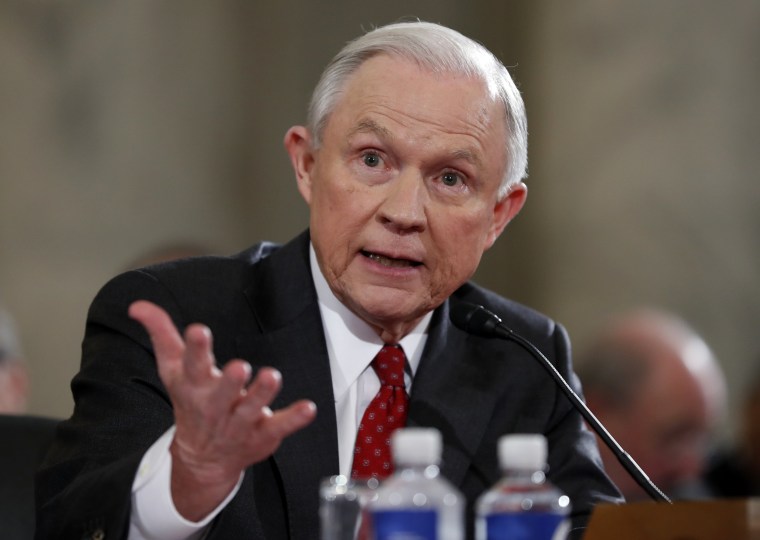First up from the God Machine this week is a new "religious liberty" task force launched by Attorney General Jeff Sessions, which didn't generate much attention, but which is likely to have a significant real-world impact.
The Alabama Republican, a longtime champion of the religious right movement's agenda, delivered a rather strident speech on Monday, launching the task force and making the case for its necessity. NBC News reported:
The task force will implement and enforce legal guidance the DOJ had previously provided regarding how to best apply religious liberty protections in federal law, Sessions said Monday at a religious freedom forum that the DOJ had convened. [...]Citing 20 points of guidance his department had released in October (which were put together after Trump issued an executive order in May 2017 ordering the federal government to protect religious liberty), Sessions said his task force would "ensure all Justice Department components are upholding that guidance in the cases they bring and defend, the arguments they make in court, the policies and regulations they adopt, and how we conduct our operations."In a memo released Monday, Sessions said the task force would "facilitate department compliance" with the guidance and "develop new strategies involving litigation, policy and legislation, to protect and promote religious liberty."
In practice, however, defining "religious liberty" isn't altogether easy. The point of Sessions' task force is to ensure that the Justice Department enforces a rather specific understanding of the term, which comports to the religious right's vision.
Or put another way, the attorney general is mandating that the Justice Department "protect" religious freedom by siding with businesses that choose to discriminate against LGBT clients, supporting employers who want to deny contraception access to their employees, and shielding pastors who ignore federal tax law by endorsing political candidates from the pulpit.
Sessions described his initiative as necessary to combat a "dangerous movement" that he and social conservatives believe is undermining American society.
"Let us be frank: a dangerous movement, undetected by many, is now challenging and eroding our great tradition of religious freedom," the attorney general argued. "There can be no doubt. This is no little matter. It must be confronted and defeated."
Sessions added, "In recent years, the cultural climate in this country -- and in the West more generally -- has become less hospitable to people of faith. Many Americans have felt that their freedom to practice their faith has been under attack.... Americans from a wide variety of backgrounds are concerned about what this changing cultural climate means for the future of religious liberty in this country. President Trump heard this concern. I believe this unease is one reason that he was elected. In substance, he said he respected people of faith and he promised to protect them in the free exercise of their faith. He declared we would say 'Merry Christmas' again."
No, really, that's what Sessions said.
It was curious, to be charitable, to see the attorney general describe a frightening environment in which Christian conservatives are victims -- a vision in which Americans needed Donald Trump, the secular, thrice-married, former casino owner, to rescue Christmas greetings -- but strange rhetoric aside, the more alarming prospect is the legal impact Americans will experience once Sessions' Justice Department begins implementing his "religious liberty guidance" in cases nationwide.
Also from the God Machine this week:
* The New York Times published a fascinating report last week on the National Prayer Breakfast and the ways in which the event has become a hotbed of behind-the-scenes political lobbying.
* The fall of a high-profile Roman Catholic leader: "Cardinal Theodore McCarrick, who last month became one of the highest-ranking Americans to be removed from public ministry because of sex abuse allegations, has resigned from the College of Cardinals in the Vatican. Pope Francis accepted the resignation and ordered McCarrick -- the former head of the Archdiocese of Washington and a well-known religious figure around the world -- to observe a life of prayer and penance in seclusion, according to a statement released by the Holy See on Saturday."
* And in a terribly unfortunate story, Todd Kincannon, former leader of the South Carolina Republican Party, was recently arrested "after police said he 'cruelly' killed his mother's dog, and told them he did it because he was acting on a command from God -- and that he was the second coming of Jesus Christ." Kincannon was a prominent Tea Party activist several years ago, before local GOP officials disassociated themselves from him.
